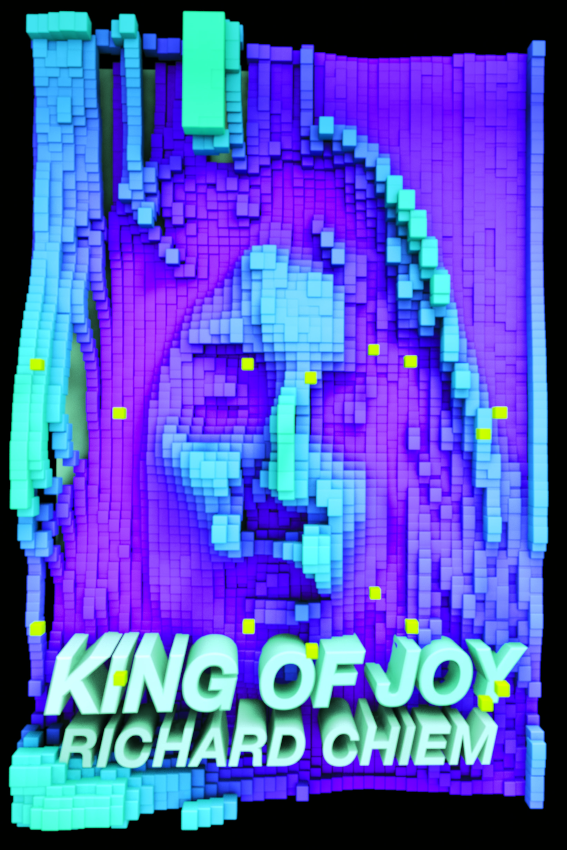
It takes a while to orient yourself in Richard Chiem’s King of Joy. It starts with a monologue of a speaker who’s drifting. “There were months where I did the same things for weeks at a time,” he says, “Meals were interchangeable, my outfits moved on and off me, and there were days I had no opinion, my mind blank, walking home alone following palm trees overhead.” We learn that his only relief from this monotony is Corvus: “I would walk in the daylight without wincing, thinking about Corvus. It was my favorite activity.”
It is only later that we learn it’s an audio clip from a play and the speaker is Perry, Corvus’s husband and even before we know this, Perry is dead and Corvus is at a porn studio compound where “half-naked girls are popping open champagne bottles” and running “in circles around the trees.” Soon, there’s a tree on fire, fog and darkness, and ringing pay phone “in the middle of the tall grass.”
It is here that Corvus lives and works as an adult actress under the directorship of Tim, a pornographer who sees himself as nothing short of revolutionary (“There is porn and there is porn and then there is Tim’s method…”) and who might also be an aspiring snuff film producer. A year into the gig, Corvus’s life, too, becomes “a dull year, repeated over and over again,” her mental state akin to Perry’s monologue, though, in her grief, the monotony is a relief.
That is until Tim lashes out violently during a filming session and Corvus, along with another performer, escapes to the mansion of Tim’s seemingly kind-hearted yet enigmatic distributor Camila, who lives on an island guarded by hippos.
We soon learn of Corvus’s past—of an abusive, neglectful household and how she connects with Perry after running away. In a way, Perry saves her and later, through his successful playwriting career, is able to shelter her in a middle-class life. But as the reader quickly finds out, he, too, is vulnerable, destructible, and it is this that eventually brings tragedy to Corvus.
It only takes a glance at King of Joy’s summary to know that Chiem is an imaginative writer. He seemingly packs with everything possible in this short novel as if it might be his last. The result is outrageous, fast-paced, and unpredictable. Chiem is a skillful writer leading us in this oddball world of hippos, porn kings, and avant-garde theatre. In its energy, King of Joy calls to mind the transgressive fiction of Chuck Palahniuk—if Palahniuk were more attuned to the emotional lives of his characters.

If Palahniuk became a voice of troubled masculinity in the age of 90s consumerism, Chiem explores what comes after—troubled, lonely humanity in the internet age. The novel is steeped in the current era: Tim checks the view count for his porn videos, Perry watches dog videos online. For Corvus, in particular, connecting with pop culture is easier than connecting with other human beings. Pop culture is where she hides. “If only Corvus could be an actor playing herself in a movie,” Chiem writes. “Perhaps then things would become more manageable.” And later, “Her daydreams are scenes from fantasy novels, sad rock songs, action-adventure movies. She imagines her body in other time zones and places, and she taps in all the time.”
The songs of Robyn make two appearances in the novel and this seems appropriate. The Swedish pop singer debuted in the nineties as a copycat Britney Spears only to disappear and re-emerge as electro-pop superstar in the late noughties with lyrics swelling with sentimentality. With lines like “I’m giving it my all, but I’m not the girl you’re taking home, oh,” and “I’m gonna love you like I’ve never been hurt before,” Robyn’s brand of sentimentality does not elicit not pity; rather her popularity stems from this acknowledgment, and even celebration, of human vulnerability.
Richard Chiem is a kind of literary Robyn circa Body Talk. Whereas Palahniuk’s characters lash out against a culture that did everything to box them in, Chiem’s characters are of a different time. We are more connected yet paradoxically more alone than ever. And we are no longer angry, or simply angry, but sad. Chiem leans into this sadness and lays his characters’ pain bare. If the novel’s events aren’t realist then at the very least the feelings are very real, genuine.
Here is Chiem on grief: “Grief is this strange chill, a dead space where there was once fire and comfort, and she fears there is no relief coming.” Chiem on mournful hope: “She wonders if prayer can somehow exist in all manners of time, an invisible guardian angel who can always relay messages, so he would always be able to know how much she loved him.” On grief again: “Grief is an out-of-body thing, the worst secret you can have. You live in one terrible place trapped inside your head while your body lives in another terrible place entirely.” Chiem works in metaphors that hit you hard in the heart.
Despite its pyrotechnics (you will remember those hippos!) King of Joy, at its core, is an utterly human story of “hard, sad people,” and how human connection can save us—if only for a while. Associated with the alt-lit movement, whose post-ironic sincerity found a welcoming space online, Chiem carries the pathos of that literary moment with him and takes it further than Tumblr blogs and Twitter feeds; he makes it flesh and blood. This novel is not only an exploration of grief; it’s a confrontation with vulnerability, a journey from stoic numbness to an embrace of human emotion, and, in the end, a celebration of our ability to be resilient.


